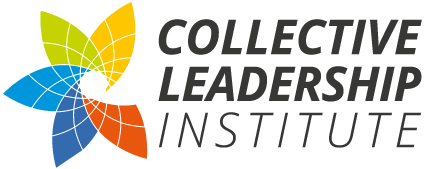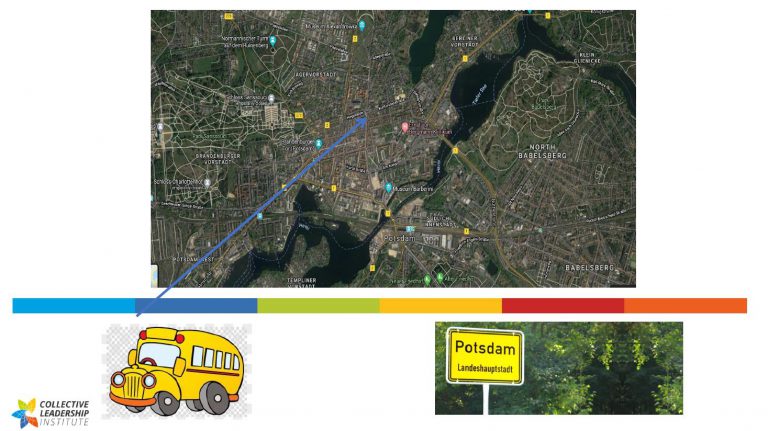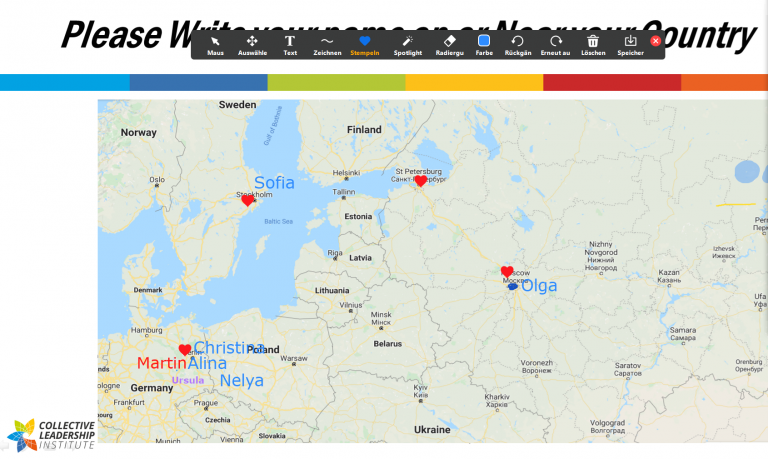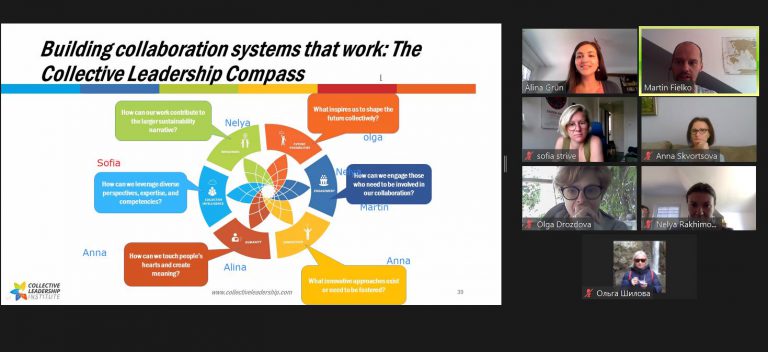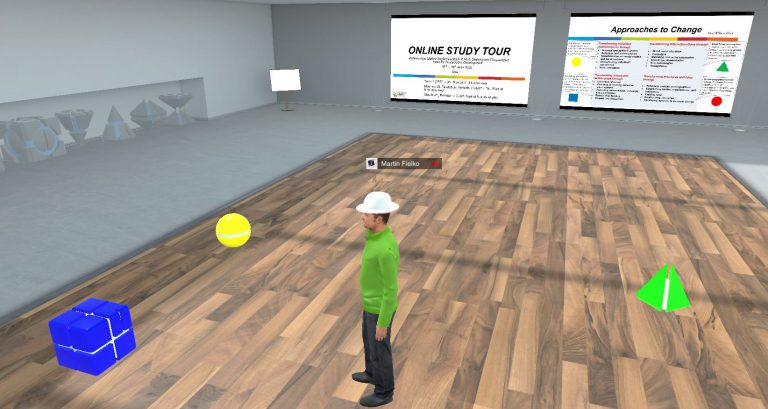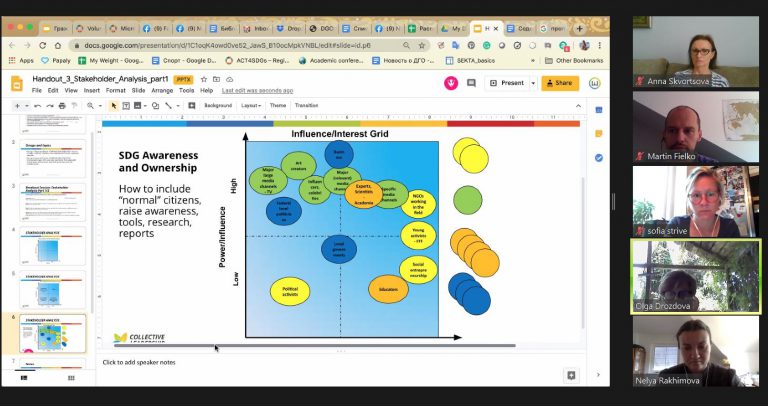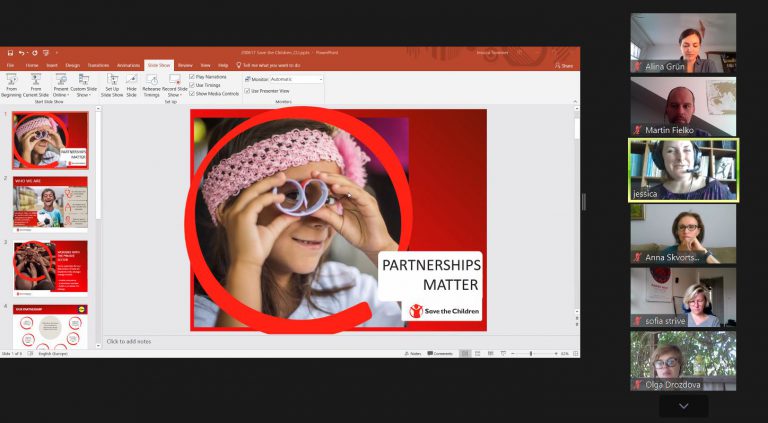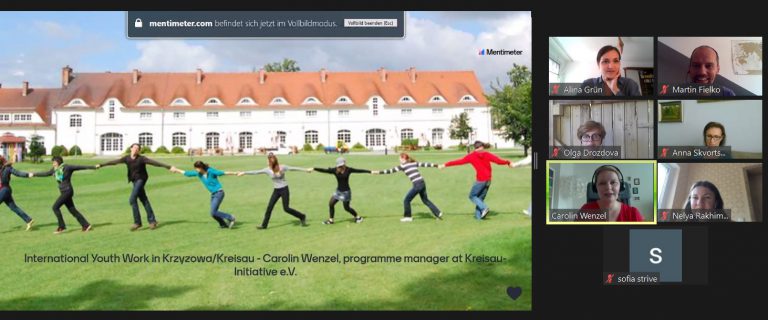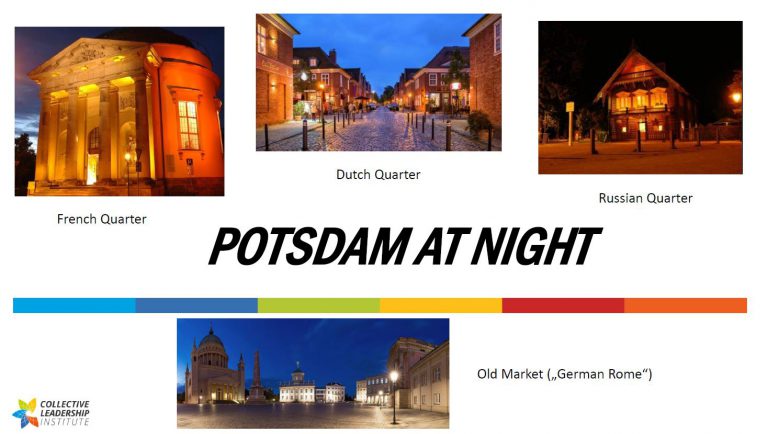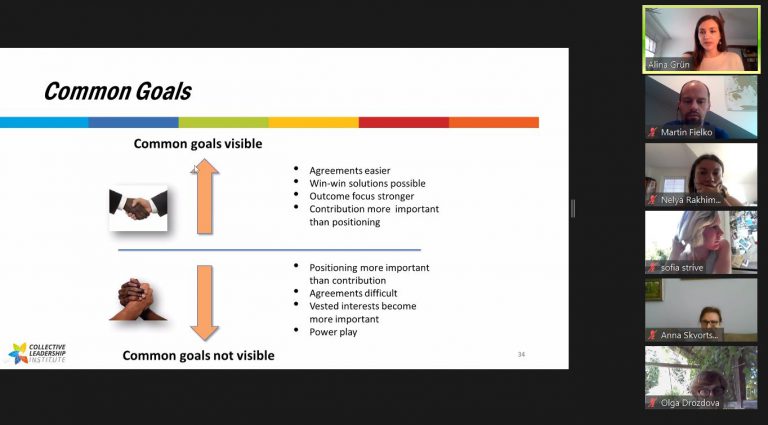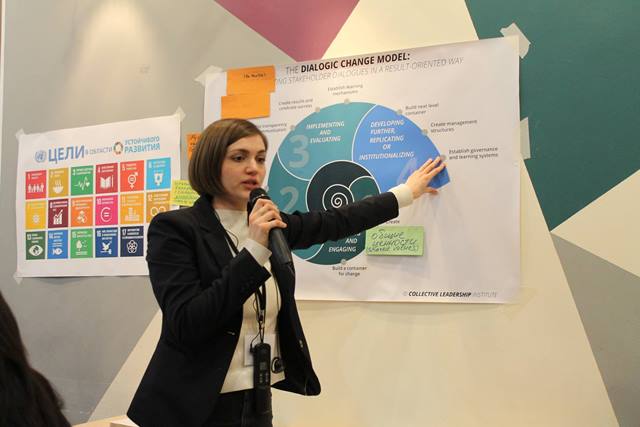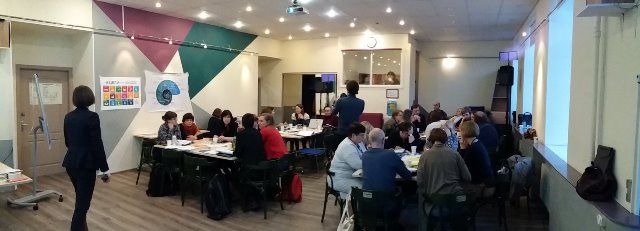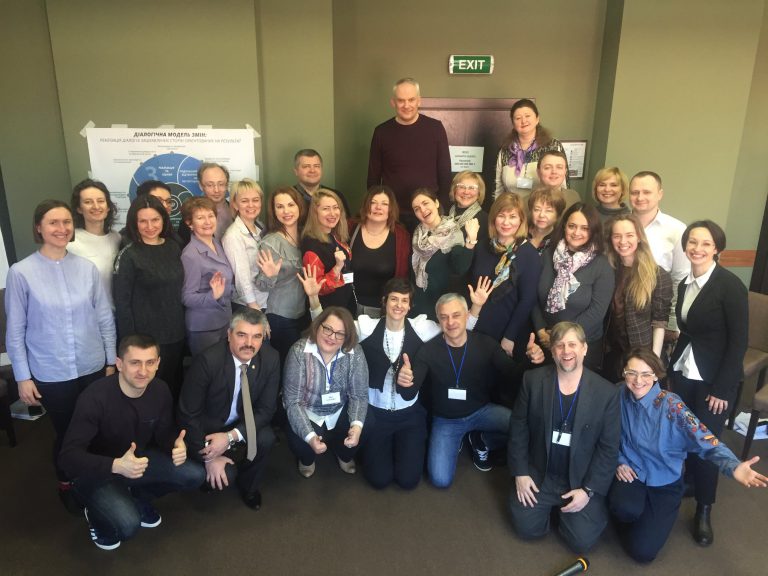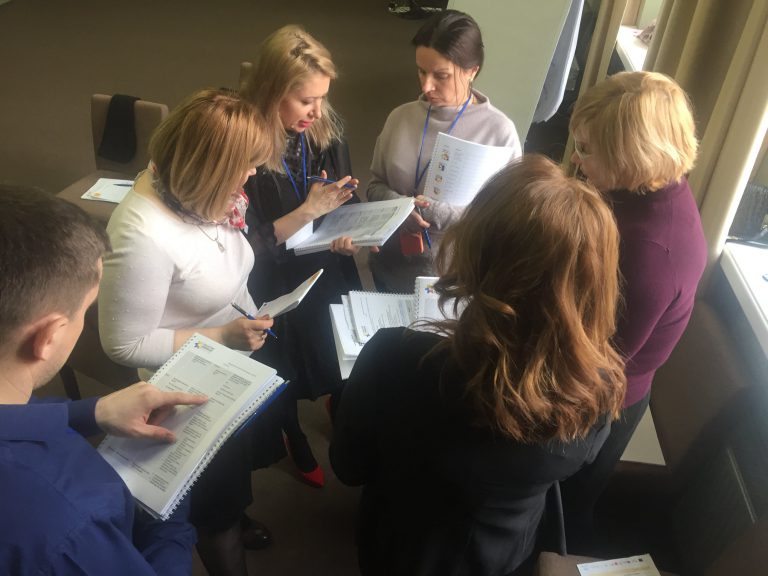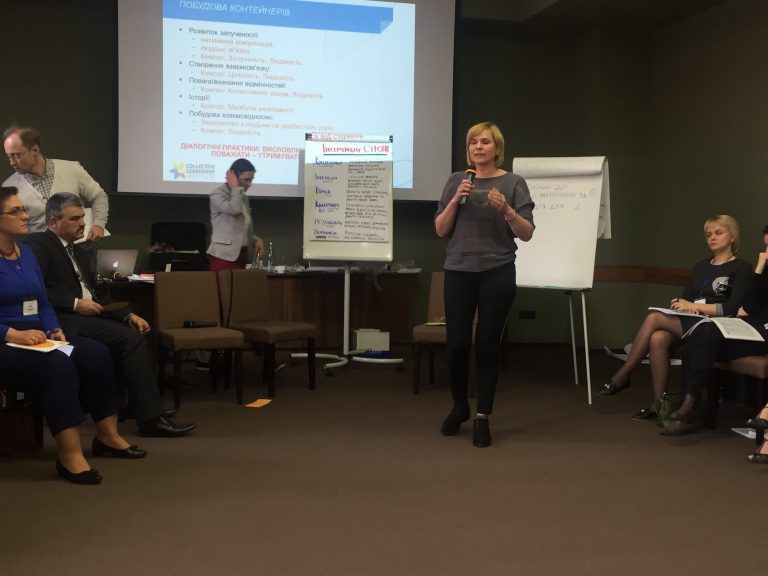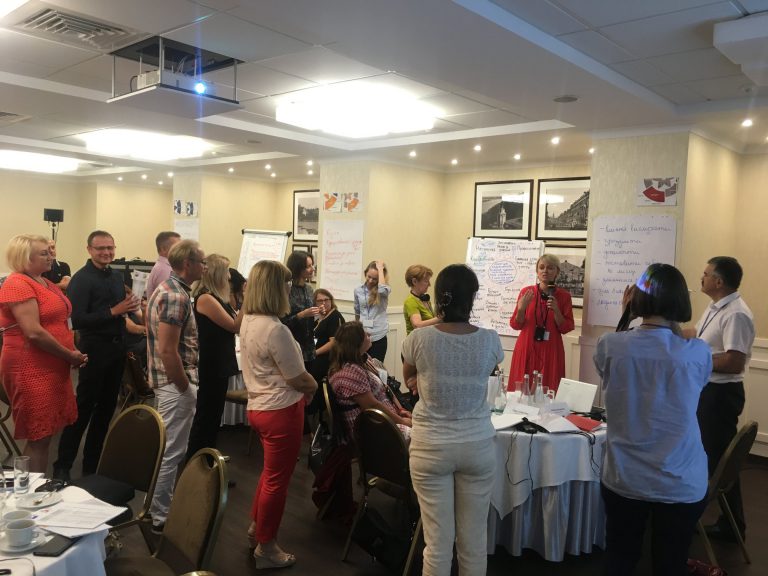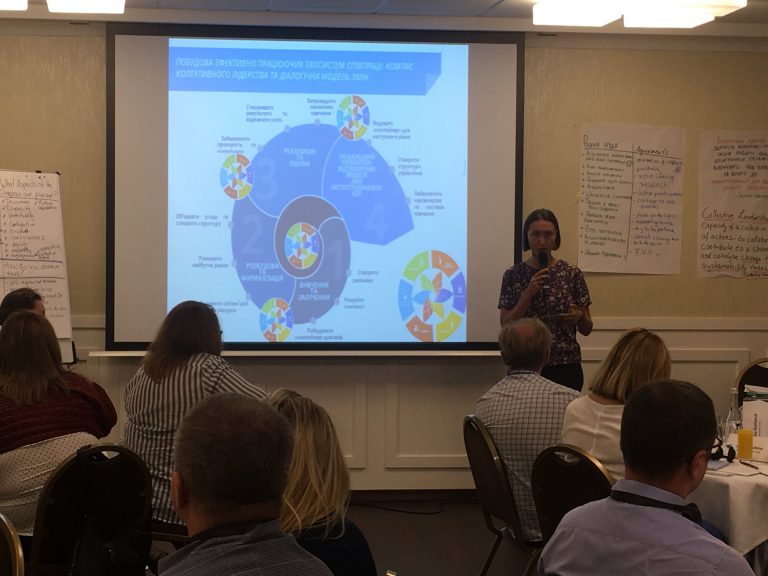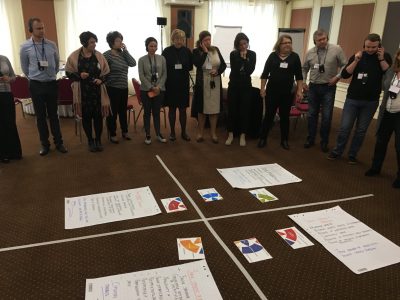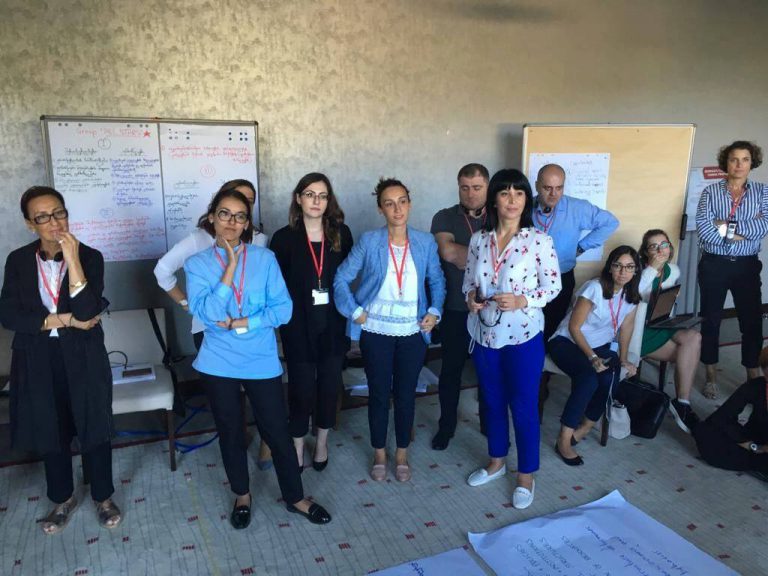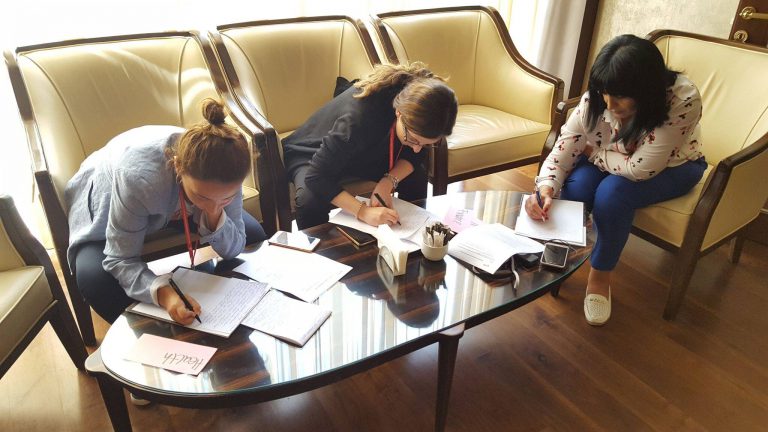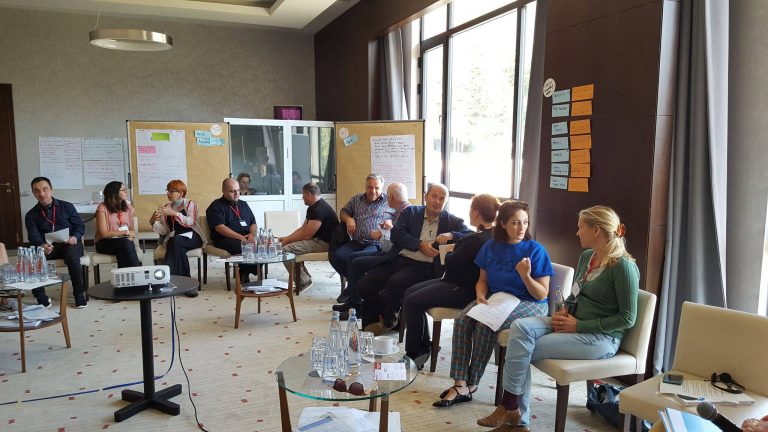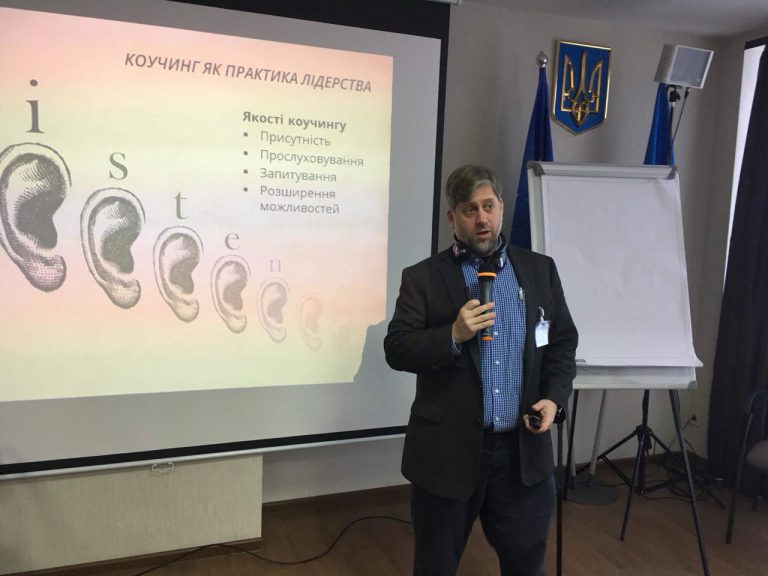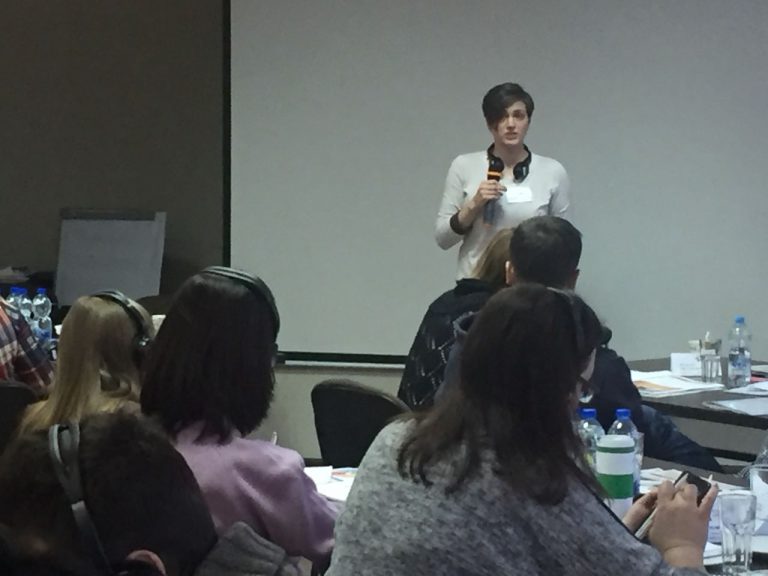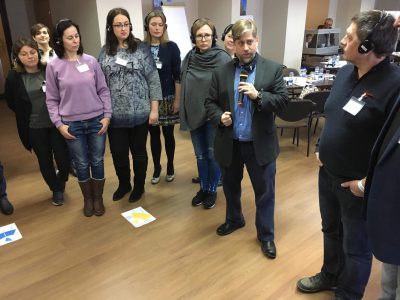CLI had the privilege of participating in this year’s Stockholm World Water Week 2024, themed “Bridging Borders: Water for a Peaceful and Sustainable Future.” In collaboration with the Stockholm International Water Institute’s (SIWI) Water for Climate Pavilion, CLI’s Douglas F. Williamson and Cholpon Aitakhunova co-facilitated a workshop for 18 Water for Climate Pavilion Envoys and the SIWI team.

Project time: 2024
Sector(s): civil society, public sector
Main SDG: 6 Clean Water and Sanitation
Stakeholders: 18 Water for Climate Pavilion Envoys and the SIWI team
Outcome: enhanced individual and collective leadership capacities of the Water for Climate Pavilion Envoys, thematic groups of the Pavilion worked on action plans to advance their collaboration and advocacy efforts in preparation for climate COP initiatives and beyond.
CLI Project Manager: Cholpon Aitakhunova, Douglas F. Williamson

Guillem Vallbona from the Collective Leadership Institute visited London to collaborate with ODI’s Tandem Programme. Together, they recorded content for a self-paced module on Collective Leadership, which was launched afterwards. The Tandem Programme is designed to support senior leaders as they navigate complex situations in challenging environments, fostering meaningful connections and effective collaboration.
Project time: 2024
Sector(s): civil society
Main SDG: 17 Partnerships for the Goals
Stakeholders: senior leaders of the ODI Tandem Programme who navigate complex situations in challenging environments, fostering meaningful connections and effective collaboration
Outcome: a self-paced module on Collective Leadership was produced and launched, a live online session for discussion on the topic was provided.
CLI Project Manager: Guillem Vallbona

CLI embarked on journeys to Albania, Moldova, and Poland to connect with existing and potential partners, gain firsthand insights into the region’s needs for CLI’s methodologies, and explore opportunities for partnerships. In 2023 the roadshow stopped in Tirana (Albania) and Warsaw (Poland). In 2024 we visited Chisinau and Razeni (both Moldova), as well as Warsaw and Krakow (both Poland).
Project time: 2023-2024
Sector(s): civil society, public sector
Main SDG: 17 Partnerships for the Goals
Stakeholders: organizations that are interested in learning more about CLI’s methodologies and approaches through individual chats, presentations, or case clinics on their current projects.
Outcome: 22 organizations visited, 57 people informed about CLI offers and methodologies in 5 cities or communities.
CLI Project Manager: Martin Fielko, Elisabeth Kuehn

CLI kicked off the self-paced online training program «Leadership and Resilience training – leadership in uncertain times». In this German language programme, participants have the chance to learn in six self-paced modules how to use the Collective Leadership Compass as a tool to strengthen aliveness and resilience in themselves, their teams, and their project processes. Each module can be accessed in CLI’s Online Academy and contains short videos and tasks on a shared exercise board. In this way every participant can work through the modules in their own time, but at the same time learn from other participants and learn from their respective work contexts.
Project time: 2024
Sector(s): civil society
Main SDG: 17 Partnerships for the Goals
Stakeholders: NGOs and small action groups working on development cooperation topics in Germany
Outcome: empowered civil society actors in enhancing their leadership capacities towards more resilience in their collaboration systems and processes, ensured that they are able to actively lead change processes and not get stuck in a pattern of ‘reacting’ to the circumstances, conducted complementary individual live coaching sessions to ensure context-related application of the methods and give participants additional support, at the end of the programme (November 2024), a hybrid event (online and in-person) will take place for all participants to exchange and connect with one another.
CLI Project Manager: Katrin Schulz, Theresa Kuschka, Guillem Vallbona, Martin Fielko

CLI’s co-executive director Martin Fielko had the pleasure of moderating a workshop with key stakeholders of GIZ’s Support to Accession Negotiations for Albania in Economic Chapters of Acquis (SANECA) project. Funded by the German Federal Ministry for Economic Cooperation and Development, the project provides technical assistance to Albanian public institutions responsible for European Union membership negotiations. Its focus lies in supporting public institutions to prepare for accession talks across EU acquis chapters under Cluster 2 – Internal Market, covering various areas: free movement of goods, workers, services, and capital; company law and competition policy; financial services; intellectual property; consumer protection; and public health.
Project time: 2024
Sector(s): public sector, private sector, civil society
Main SDG: 16 Peace, Justice and Strong Institutions
Stakeholders: key actors from the Chief Negotiator’s office, Minstries, private sector entities and chambers, as well as civil society
Outcome: Participants met first time in a multi-stakeholder setting, reflected about achievements from phase 1 and improvements for phase 2 of the project, specific topics and priorities were identified and a draft action plan on the priority topic “business readiness assessment” was co-created.
CLI Project Manager: Martin Fielko
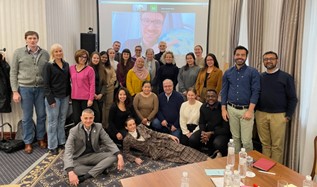
CLI team members Maryana Zaviyska and Dominic Stucker had the pleasure of co-facilitating a hybrid workshop in Kyiv, Ukraine for 25 members of the International Federation of Red Cross and Red Crescent Societies (IFRC) in December 2023. The IFRC is helping to coordinate emergency response in Ukraine and other countries impacted by the conflict, in collaboration with local Red Cross and Red Crescent teams. This includes increasing capacity building of Red Cross Red Crescent teams to bolster locally-led humanitarian action. With Maryana on-site in Kyiv and Dominic online, participants were introduced to the Collective Leadership Compass and the concept of nurturing “patterns of aliveness,” which they applied to themselves and their broader Collaboration Ecosystem in Ukraine.
Project time: 2023
Sector(s): public sector, civil society
Main SDG: 16 Peace, Justice and Strong Institutions
Stakeholders: 25 members of the International Federation of Red Cross and Red Crescent Societies (IFRC)
Outcome: Participants were introduced to the Collective Leadership Compass and the concept of nurturing “patterns of aliveness”, team level assessment results showed strengths in the dimensions of Humanity and in Innovation, with need for further development of Collective Intelligence, the IFRC team is using the workshop results to enliven collaborations with local Red Cross and Red Crescent teams to further contribute to locally led humanitarian action.
CLI Project Managers: Maryana Zaviyska, Dominic Stucker

CLI’s online training program Better Together is aimed at small NGOs and voluntary initiatives. It’s funded by Engagement Global and can therefore be offered completely free of charge. The goal is to expand the impact of the small NGOs projects and initiatives and to strengthen dialogic skills in digital spaces. Usually, CLI partners with the major players in development policy and supports large change projects in their process planning. Now, the Better Together program is intended to also provide the smaller players with the same methodologies and tools to expand their dialogue and collaboration structures.
Project time: 2022-2023
Sector(s): civil society
Main SDG: 4 Quality Education
Stakeholders: small NGOs and voluntary initiatives working in development cooperation (CIGS – Citizen Initiatives in Global Solidarity)
Outcome: A kick-off session outling the main features to the stakeholders has been conducted, four online training modules on the Dialogic Model complemented by self-paced online modules will be conducted in 2023, along with individual coaching sessions to further enhance the outreach and impact of participants’ projects.
CLI Project Managers: Theresa Kuschka, Alina Gruen, Martin Fielko

CLI started an online training program for German actors who are active in the aid work for Ukrainian refugees in Germany. The idea is both to strengthen the already existing local aid structures and to facilitate the exchange of experiences and best practices among different municipalities and cities. Since the start of the Russian war of aggression in Ukraine, many Ukrainian refugees have come to Germany. Many new local aid networks and initial alliances between various actors have emerged, all united by the idea of solidarity to support the people arriving from Ukraine as best as possible. We see this momentum as an opportunity in the cities and municipalities to think more long-term and to jointly develop sustainable dialogue and cooperation structures in order to better coordinate the support offers for Ukrainian refugees, but also the processes of future refugee movements.
Project time: 2022
Sector(s): civil society, public sector
Main SDG: 17 Partnerships
Stakeholders: Four municipalities in Germany and their local Ukraine support networks
Outcome: An online training series on stakeholder engagement for people working in public administration, church organisations, and volunteers has been conducted, cross-sectoral collaboration and sustainable network structures have been discussed, and a final event in Lower Saxony will explore opportunities to sustain and expand the cross-municipality collaboration.
CLI Project Managers: Theresa Kuschka, Katharina Maier, Maryana Zaviyska

Fingo is a Finnish NGO platform and an expert on global development that represents approximately 280 civil society organisations as members. Its aim is to bring together people and organisations across the globe in transformative collaboration structures that support civil society’s role in implementing the Sustainability Development Goals (SDGs).
With the increasingly complex challenges of transformative SDG implementation, the © Collective Leadership Compass has been identified by Fingo as a key methodology for its future. Specifically, Fingo envisions the tool supporting the organisation’s strategic advancement. The Compass will act as a guiding structure that supports Fingo’s mission and help them navigate complex settings and transformative change in collaborative ways.
Project time: 2021-22
Sector(s): civil society
Main SDG: 17 Partnerships
Stakeholders: 14 change agents within Fingo’s organisation
Outcome: The systemic approach of the Collective Leadership Compass is understood, what Collective Leadership means in Fingo’s practice is defined, concrete action plans for bringing Collective Leadership into the daily work have been developed.
CLI Project Managers: Elisabeth Kuehn, Martin Fielko
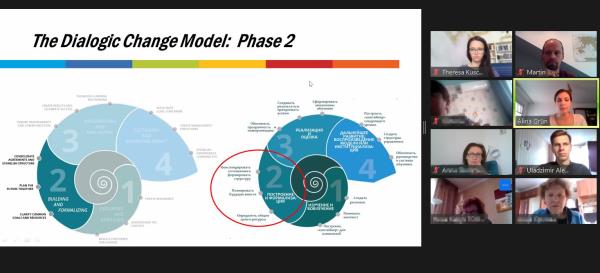
In the beginning of June 2020, CLI started the project “Platform for Civil society Dialogue” with a three-day Kick-Off Workshop in cooperation with its Belarusian and Russian partners. The project focuses on the development of a dialogue platform between representatives of Russian and Belarusian civil society organizations who are engaged in the social sector, particularly in inclusion and strengthening rights of marginalized social groups such as women, persons with disabilities, and senior citizens.
Project time: 2020-22
Sector(s): civil society
Main SDG: 17 Partnerships
Stakeholders: CSOs from Russia and Belarus who are active in the social sector, for each country one partner NGO
Outcome: Increased opportunities for cooperation and partnership between the organizations’ representatives, a constructive dialogue and cooperation structure among civil society organizations in Belarus and Russia, promoted discussion of values, scaled network collaboration and dialogue.
CLI Project Managers: Alina Gruen, Martin Fielko, Theresa Kuschka, Andi Shehu 


CLI conducted an online study tour called “Partnerships Matter – Implementation of Multi Stakeholder Cooperation Tools for Sustainable Development” for Russian NGOs and their Swedish and German counterpartsin June 2020. The participants learned about the methodology of the Dialogic Change Model, exchanged with practitioners from four German NGOs, and formulated concrete next steps for the working group “civic participation for sustainable development” of the forum. This project was funded by EU-Russia Civil Society Forum.
Project time: 2020
Sector(s): civil society
Main SDG: 17 Partnerships for the goals
Stakeholders: Experienced leaders of 4 Russian NGOs, 1 Swedish, 1 German NGOs, their beneficiaries, and 4 experts on partnerships from German NGOs
Outcome: A resource paper on partnerships methodologies and tools was published, the trust and will to collaborate among Russian and EU NGOs increased, a concrete work plan until May 2021 to increase SDG awareness within the EU-Russia Civil Society Forum and beyond was developed.
CLI Project Managers: Alina Gruen, Ursula Ploetz, Martin Fielko
Funded by:
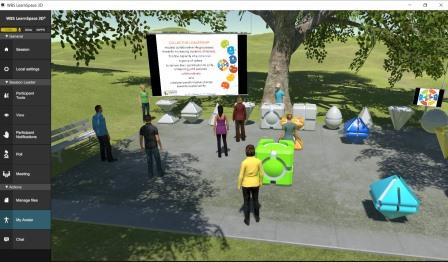
Participants from Cilvil Society learn about and build their capacities regarding practical development topics and approaches to stakeholder collaboration supported by digital dialogue platforms, including how the latter can be used to improve international cooperation. DIGIPEER started in December, 2019 and is a free of cost program for German development NGOs and their implementation partners.
Project time: 2019-2020
Sector(s): civil society
Main SDG: 17 Partnerships for the goals
Stakeholders: German development NGOs and their international implementation partners
Outcome: A study on how digital dialogue can be enhanced was conducted, in total six online seminars took place, key players of German development NGOs and their project partners were equipped with digital dialogue tools
CLI Project Managers: Sabine Heckmann, Ursula Ploetz

UNV mobilizes volunteers for the UN system, including for humanitarian and post-conflict situations, as well as promotes volunteerism globally. For their international Communications and Partnerships teams (based in Bonn), CLI offered an intensive, two-day workshop. The teams received a heavy dose of Collective Leadership with exposure to both the Dialogic Change Model and the Collective Leadership Compass. The participants worked with both tools to better understand their teams, how to collaborate better across teams, and how to begin to enliven their wider stakeholder systems.
Project time: 2019
Sector(s): public sector
Main SDG: 17 Partnerships
Stakeholders: 10 team members of the UNV communications and partnerships department
Outcome: Better understanding of UNV’s teams, how to collaborate better across teams, and how to enliven the wider stakeholder systems.
CLI Project Manager: Douglas F. Williamson
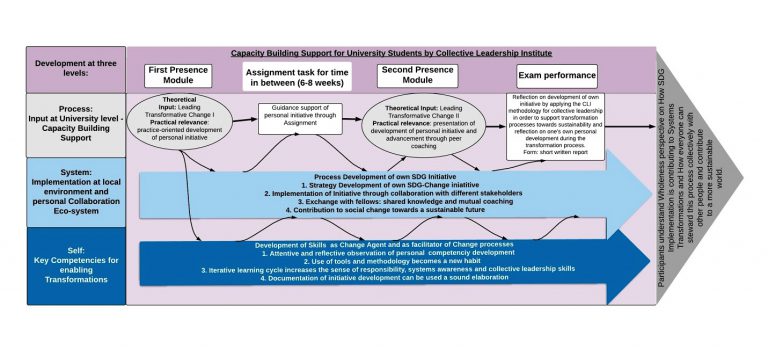
CLI has begun to introduce its core methodology into the formal academic sector. The intention is provide Collective Leadership concepts to learners at younger ages. In 2017, CLI started its academic partnerships with the University of Applied Sciences in Neubrandenburg and in 2019 with the University of Applied Sciences Konstanz. CLI is attempting to integrate the Collective Leadership approach into lectures and curricula to support youth and young adults to create the future they want.
Project time: start 2017, ongoing
Sector(s): public sector
Main SDG: 4 Quality Education
Stakeholders: University of Applied Sciences in Neubrandenburg, University of Applied Sciences Konstanz
Outcome: Lectures with workshop character are offered at the universities, started to build capacity in using the CLI methods to train multipliers within universities so that these lectures can be held by lecturers and professors themselves.
CLI Project Manager: Alina Gruen

CLI entered into a year-long partnership agreement with Engagement Global’s Mentoring for Education for Sustainable Development Leadership Programme. The programme is for twenty young professionals from Germany, India, Mexico and South Africa working in the field of Education for Sustainable Development (ESD). As part of the programme’s offering in competencies in the areas of project management and ESD-Leadership, each mentee is partnered with an ESD Expert mentor for support in the realization and implementation of the mentees’ sustainability projects. CLI facilitates online and offline Project Management and Leadership learning sessions.
Project time: 2019
Sector(s): civil society
Main SDG: 17 Partnerships
Stakeholders: 20 young professionals from Germany, India, Mexico, South Africa in the field of education for sustainable development
Outcome: Mentees develop an understanding of leadership in the context of social change, strengthen their personal development, develop leadership skills at individual-, process-, and systems level; and successfully apply CLI methodologies in practice.
CLI Project Managers: Alina Gruen, Lulekwa Gqiba
CLI facilitated two workshops that introduced both core methodologies, the Dialogic Change Model and the Collective Leadership Compass, with a focus on SDG 17. The participants of a conference on the Sustainable Development Goals in St. Petersburg, Russia, saw the need to collaborate and build partnerships in order to proceed with their projects. CLI’s seminar inputs gave them an impression of how this could be achieved in practice. Furthermore, the conference fostered a lively and active exchange between the Russian and EU NGOs. This is the start of a collaboration with the EU-Russia Civil Society Forum.
Project time: 2019
Sector(s): civil society
Main SDG: 17 Partnerships
Stakeholders: > 170 civil society organisations from Russia and the EU
Outcome: Awareness for SDGs in Russia and the need for partnerships is built; basic competences for collaboration are built among 40 multipliers
CLI Project Managers: Alina Gruen, Martin Fielko
The Ukrainian heath sector is challenged by ineffective service, poor health outcomes, and dissatisfied workers at many levels. In order to revitalize the sector and address the systemic challenges and lead to positive health outcomes for the larger Ukrainian citizenry Collective Leadership Institute became GIZ’s cooperation partner for the project GIZ Support Decentralization Reform in Ukraine – U-LEAD with Europe. By providing series of trainings CLI supports involved parties in becoming Collective Leaders, equipped with several powerful tools to begin to steer the health care sector in a sustainable direction.
Project time: 2018-2019
Sector(s): public sector
Main SDG: 3 Good Health and Well-Being
Stakeholders: 24 change agents in the Ukrainian Health Sector Decentralization initiative
Outcome: 24 participants become Collective Leaders, equipped with several powerful tools to begin to steer the health care sector in a sustainable direction in Ukraine.
CLI Project Managers: Douglas F. Williamson, Alina Gruen, Maryana Zaviyska (CLI’s Associate)
In order to implement Georgia’s national commitments for the implementation of the Paris Agreement under the United Nations Framework Convention on Climate Change multi-stakeholder collaboration is essential.
Deutsche Gesellschaft für Internationale Zusammenarbeit (GIZ) GmbH has been supporting several processes, including “processes, methodologies and instruments for long-term decarbonization planning and the integration into national targets to fight climate change while also considering economic transformation targets and enhance the capacities of public decision-makers and institutions for the application of necessary integrated and inter-institutional planning processes.”
In this context, the Collective Leadership Institute was asked by GIZ to facilitate a tailored three-day stakeholder engagement workshop for 23 people from the national and provincial levels in September 2018 in Borjomi, in close collaboration with the Climate Change Unit (CCU) in Georgia and the New Climate Institute (NCI) in Germany.
Project time: 2018
Sector(s): public sector
Main SDG: 13 Climate Action
Stakeholders: 23 persons from the Deutsche Gesellschaft für Internationale Zusammenarbeit (GIZ) GmbH, Climate Change Unit (CCU) in Georgia and the New Climate Institute (NCI)
Outcome: 23 people from the national and provincial levels participated and exchanged information and experience to jointly understand current challenges and opportunities for climate change action in Georgia. The participants started to jointly define priorities and inter-sectoral and inter-disciplinary engagement structures for the development of a Climate Action Plan roadmap for the next months
CLI Project Managers: Krisitane Schäfer, Sabine Heckmann

CLI supported the successful launch of the project “Countering Serious Crime in Western Balkans”, a project that aims to strengthen the fight against serious organized crime in six Western Balkan countries with a collaborative approach uniting police and prosecution. CLI combined its Dialogic Change Model with the Collective Leadership Compass to plan and facilitate both a regional planning workshop and six individual kick-off workshops with the countries’ respective project teams and representatives from national partners.
Some words from our client:
“Thank you very much for the report and all the energy you have invested into our project. Sometimes much more than you can expect from a consultancy, I would say, and we have been profiting very much not only from your expertise, but also your personalities and the way you work and communicate with the people around you.” – Christopher Will, GIZ Project Manager, IPA Countering Serious Crime in the Western Balkans.
Project time: 2017 – 2019
Sector(s): public sector
Main SDG: 16 Peace, Justice and Strong Institutions
Stakeholders:
Outcome: National and regional collaboration and communication agreements were reached. , as well as a regional team spirit for a collaborative and bottom-up approach to launch the project with local partners. The kick-off workshops of the project in each of the partner countries were planned.
CLI Project Managers: Douglas F. Willamson, Elisabeth Kühn
In July 2018, CLI finished its cooperation partnership work with GIZ on the “Vocational Integration of Internally Displaced Persons in Ukraine” project, focusing on “Support for Innovative Multi-Stakeholder Projects”. CLI’s involvement entailed a specially-created format of three three-day workshops that relied on the Collective Leadership Compass as a primary methodology, but was also heavily reliant on the Dialogic Change Model (DCM).
The objective of the larger GIZ project was to generate innovative Multi-Stakeholder Partnership project ideas to address the chronic issue of employment integration challenges of internally displaced persons due to the conflict in Eastern Ukraine in 2014. Agenda 2030 was always in focus and CLI brought its expertise on SDG No. 17 Partnership for the Goals to the forefront. However, there were project ideas that touched on many of the other SDGs including SDG No. 1 No Poverty, No. 8 Decent Work and Economic Growth, No. 9 Industry, Innovation and Infrastructure, No. 10 Reduced Inequalities, No. 11 Sustainable Cities and Communities, and No. 16 Peace, Justice and Strong Institutions.
The prospect for the larger GIZ project was significantly advanced by CLI’s powerful collaboration ecosystem and Collective Leadership approach.
Project time: 2017 – 2018
Sector(s): public sector
Main SDG: 17 Partnerships for the Goals
Stakeholders: >170 people engaged in the processes (GIZ members, ministries, stakeholders from the central and Oblast level)
Outcome: Training of and empowering 36 persons from six Oblast-level teams to create and prepare innovative Multi-Stakeholder Partnership project ideas to address the chronic issue of employment integration challenges of internally displaced persons in Ukraine
CLI Project Managers: Douglas F. Willamson, Alina Grün

Navigating and implementing high-quality partnering processes, a prerequisite to implement the SDGs, provokes the question, “What does it take to unleash the collaboration potential for achieving the SDGs?” The Promoting Effective Partnerships Initiative (PEP), of which the Collective Leadership is one of five partners, will promote clarity in language and concepts, signposting through the spectrum of different partnering approaches, tools, and support offers. PEP further aims to engage and exchange with practitioners and experts in order to co-develop the professional field of partnering and build impact networks of practitioners.
Project time: 2016
Sector(s): civil society, private sector, public sector
Main SDG: 17 Partnerships
Stakeholders: 5 pioneering organisations in capacity building for partnerships
Outcome: A website effectivepartnering.org has been developed with plenty of resources for practitioners and researchers in the field of partnering.
CLI Project Managers: Dr. Petra Kuenkel, Douglas F. Williamson

Establishing effective government structures for cross-cutting issues such as gender equality and women’s empowerment is inherently complex. The challenge in Georgia is augmented by low public awareness and minimal political initiative. Using the Stakeholder Dialogues approach, especially Phase 1 of the Dialogic Change Model (DCM) “Exploring and Engaging”, UN Women managed to create a container for change. The success worth celebrating thus far is the appointment of advisory positions for gender equality and women rights by the Georgian Prime Minister.
Project time: 2012-2013
Sector(s): public sector, civil society
Main SDG: 5 Gender Equality
Stakeholders: 20 high level representatives from the Georgian government, UN organisations, international and local NGOs
Outcome: A high level stakeholder event was organized by UN Women Georgia, a ‘container for change’ was created to lobby for gender equality and human rights at all government levels, a new position of an assistant to the Prime Minister dealing exclusively with gender equality and women’s rights issues was established.
CLI Project Manager: Andrew Aitken
